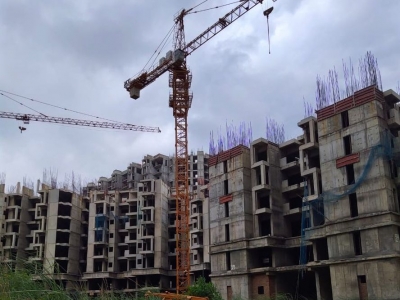Investment in REITs, InvITs to fuel multi-sector economic growth: EY
By IANS | Published: July 26, 2021 06:39 PM2021-07-26T18:39:14+5:302021-07-26T18:55:09+5:30
New Delhi, July 26 Real estate investment trusts (REITs) and Infrastructure investment trusts (InvITs) have been gaining traction ...

Investment in REITs, InvITs to fuel multi-sector economic growth: EY
New Delhi, July 26 Real estate investment trusts (REITs) and Infrastructure investment trusts (InvITs) have been gaining traction in India as has been the experience in other developed economies with both the fundraising avenues raising capital of over $9.7 billion (including deals announced) in the country, according to an EY report.
The report titled 'REITs and InvITs - financing urbanization and infrastructure in India,' with favourable government policies and a long-term investment outlook, many marquee investors including sovereign and pension funds are continuing to invest in such vehicles and are benefiting from receiving regular cash distributions, stable yield with sponsors getting the opportunity to expand their asset base.
The National Infrastructure Pipeline announced by the Government of India has estimated a funding requirement of over $1.4 trillion by 2025. Early trends of performance of REITs/InvITs in India are encouraging with the combined market-cap of the three listed REITs in India currently at over US$7 billion and over US$10 billion for InvITs.
REITs and InvITs can be used to attract private investments in the infrastructure and real estate sectors by mitigating challenges such as funding requirement, more long term capital, optimal leverage, limited exit options and corporate governance issues.
According to the report, InvITs are expected to play a key role in the monetization of existing projects in some sectors namely roads and highways, conventional power, renewable energy, airports, railways, digital infrastructure, etc. This is against a backdrop of conducive regulatory frameworks and cash flow profiles with taxation advantages for such vehicles.
For REITs, despite the near to medium term headwinds from COVID-19, the long-term drivers for real estate demand are strong and likely to withstand adversities in the sector.
Gaurav Karnik, Partner and National Leader - Real Estate, EY India added, "InvITS and REITs will play a significant role in funding the Government's infrastructure plans as well as assist in meeting its asset monetization plans and at the same time enable deleveraging existing balance sheets which would in turn help meet the capitalization requirements of banks."
REITs/InvITs are primarily governed by the SEBI Infrastructure Investment Trusts Regulations, 2014 and SEBI Real Estate Investment Trusts Regulations, 2014 and various circulars issued under these regulations. While InvITs can be public listed, private listed or private unlisted, REITs are required to be publicly listed. Under SEBI regulations, three years of audited combined financial information under Ind AS needs to be presented.
Some of the practical challenges that arise include availability of financial information, different auditors of the investment trust and those of SPVs before acquisition, GAAP conversion from Indian GAAP to Ind AS and the need to have uniform accounting policies.
In addition, the report said, there are other complex areas related to asset acquisition or business combination, classification of unit capital and appropriate accounting for distribution.
Sandip Khetan, Partner and National Leader, Financial Accounting Advisory Services (FAAS), EY India said, "Accounting for REIT/InvITs can be complex with multiple legal entities being involved and the interplay of various regulations. Having the relevant structure in place early and evaluating the relevant tax, accounting and other implications would allow sponsor(s) to make the most of this increasingly popular route to funding."
REITs and InvITs are pass through vehicles under Income tax and hence distributions made by the investment trusts are taxed directly in the hands of investors depending on the nature of such distributions i.e. dividend, interest or capital repayment. There is a beneficial tax regime for dividends received from REITs/InvITs subject to certain conditions. Government, including SEBI and other regulators have played a proactive role in popularizing and promoting these investment trusts. Sponsors/management also have an important role in establishing high standards of corporate governance which is a pre-requisite for any investment.
The Government, including SEBI and other regulators, have played a proactive role in popularizing and promoting these investment trusts. The recent step by SEBI on the reduction of minimum subscription size and trading lot for InvITs/ REITs, is expected to bolster liquidity of instruments further. Consistency in financial reporting, better transparency (benchmarking) and understandability for overseas investors are key ingredients for long-term success.
Disclaimer: This post has been auto-published from an agency feed without any modifications to the text and has not been reviewed by an editor
Open in app